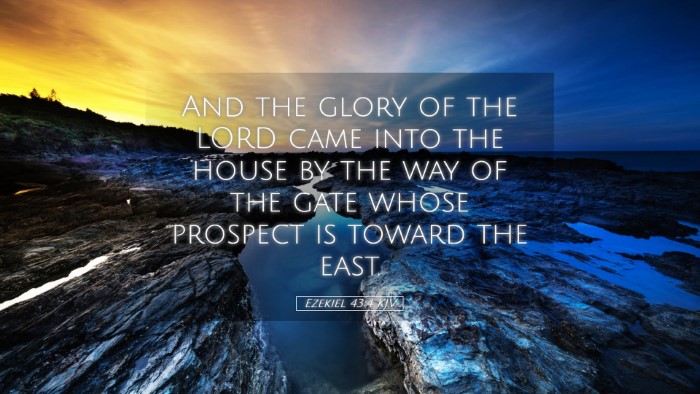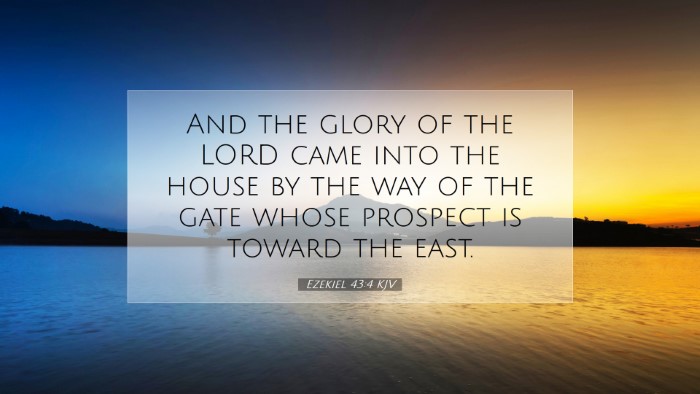Ezekiel 43:4 Commentary
Verse Reference: Ezekiel 43:4 - "And the glory of the LORD came into the house by the way of the gate whose prospect is toward the east."
Introduction
This profound verse marks a pivotal moment in Ezekiel’s vision, illustrating the return of the divine presence of God to the temple in Jerusalem. The implications of this passage are rich in theological significance and serve as a harbinger of restoration for Israel.
The Glory of the LORD
Definition and Significance: The term "glory" (Hebrew: kavod) represents the manifest presence of God. Reflecting on the nature of God's glory, Matthew Henry notes that it encapsulates God's holiness, power, and majesty. This divine glory signifies not just God's presence but also His favor and covenant relationship with His people.
The Context of Ezekiel's Vision
Historical Background: Ezekiel prophesied during the Babylonian captivity, a time when the nation of Israel had lost its temple and, seemingly, its relationship with God. In this setting, the return of God’s glory served as a powerful message of hope, signaling divine restoration.
Albert Barnes emphasizes that this vision serves not just as a physical promise of God's return to the temple but also a spiritual renewal for the people of Israel. It denotes a shift from judgment to grace.
Theological Implications of the Southern Entrance
Eastward Direction: The mention of the east as the direction from which the glory enters holds significant symbolic meaning. In ancient Near Eastern thought, the east often represented new beginnings, light, and revelation. Adam Clarke draws parallels between this entry and the biblical narrative of creation, suggesting that God’s presence brings life and renewal, akin to the dawn of a new day.
Symbolism of the Temple Rebuilt
- Restoration of Worship: The reestablishment of God's glory within the temple signifies the restoration of proper worship and communal identity. For the people of Israel, the temple was the focal point of their relationship with God.
- The New Covenant: This event can also be seen as a foreshadowing of the New Covenant in Christ, where believers are now the temple of the Holy Spirit. Barnes expounds on the idea that this verse illustrates God's desire to dwell among His people intimately.
Application for Today
For pastors and theologians, the implications of this verse transcend its historical context. The entry of God's glory into the temple invites reflection on the present-day presence of God in the life of the church. Matthew Henry encourages believers to recognize that God's glory is not confined to a physical temple but dwells within the hearts of the faithful.
Conclusion
In Ezekiel 43:4, we see a powerful representation of God's restorative promise. As His glory returns to the temple, we are reminded of His relentless pursuit of relationship with humanity. This verse serves as a testament to God's faithfulness and a call to all believers to recognize the glory of the LORD in their midst, encouraging a posture of worship, reverence, and expectation for divine renewal.


